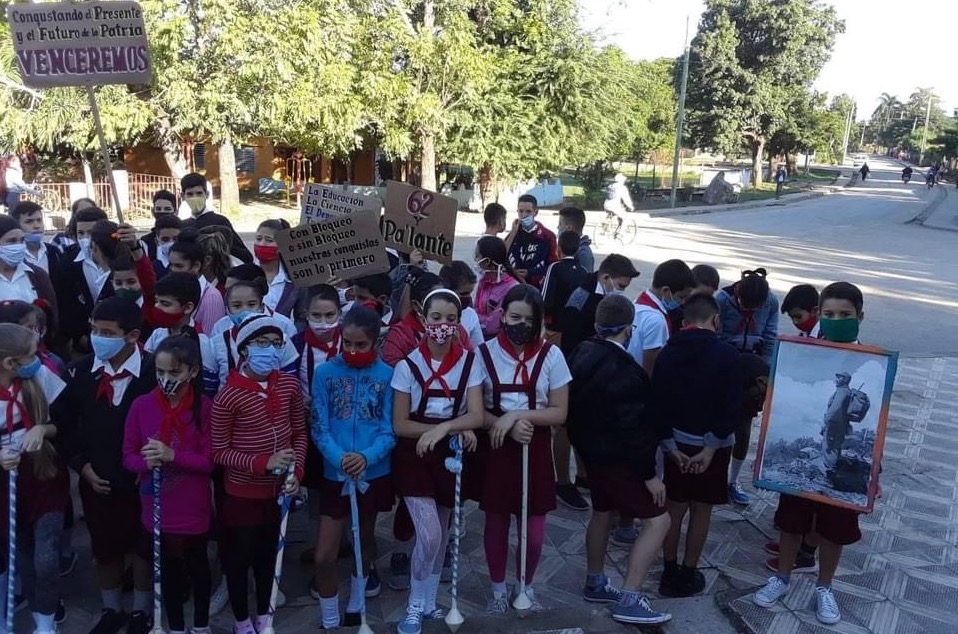In February 2020, Dr. Nelva Ismarys Ortega, the wife of opposition leader José Daniel Ferrer and the mother of his youngest son, condemned threats by Cuban authorities to seize her baby, then seven months old. That same month State Security agents attempted to intimidate independent journalist Yadisley Rodríguez Ramírez by depriving her of custody of her three children if she continued her political activism against the regime. Last July, Rosmelis Hernandez, wife of the dissident rapper Maykel Castillo Perez, aka Maykel Osorbo, received the same ultimatum from a police officer.
These threats attack the legal institution of Parental Custody, a set of duties and rights that the law confers on parents over their minor or dependent children. This institution is exclusive to the parents and, when they die or are deprived of it, it cannot be transferred to another member of the family.
According to Article 93 of the Family Code, "both parents, or one of them, shall lose parental custody of their children: 1) When dictated as a sanction following a final verdict in a criminal proceeding. 2) When imposed on one them via a notarial deed of divorce, or by a firm sentence dictated after a divorce or nullity of marriage trial, or when both are deprived of it by a judicial resolution."
According to Article 95, the courts may deprive both parents, or one of them, of custody when: 1) they seriously fail to comply with the duties set forth in Article 85; 2) they induce the child to perform a criminal act; 3) they abandon the country and, therefore, their children; 4) they observe degenerate, corrupting, criminal or dangerous conduct that is incompatible with the due exercise of parental authority; 5) they commit a crime against the child.
The duties referred to in Section 1), which are set out in Article 85, and which parents may not fail to fulfil, include providing their children with adequate food, looking after their health and personal hygiene, ensuring their attendance at school, and seeing to the education of their children for life in society. They are also to "instill in them a love for their country, respect for its symbols, and due reverence for its values, the internationalist spirit, the norms of coexistence, and socialist morality."
Article 95 is open to whatever interpretation a court may wish to give it, as sections 1 and 4 of the article could cover a wide range of issues. Therefore, it is possible for the regime to deprive a mother or father, temporarily or permanently, of parental custody due to their political activities, or mere statements that the Cuban authorities “criminalize.”
According to the police officer who threatened Rosmelis Hernandez, what the girl is learning in school would clash with the fact that she and Maykel Castillo are not "teaching her the real concepts of the Revolution," which could "generate a behavioral disorder" in the child.
If we analyze Section 1 of said Article 95, the state considers it the obligation of parents to inculcate in their children the norms "of socialist morality," and failure to do so could constitute a serious breach.
Considering the number of journalists and activists who have been threatened with the loss of their custody rights, a judge might consider the attitude of Maykel Osorbo and Rosmelis Hernandez to be "corrupt, criminal and dangerous." He could even conclude that the girl runs the risk of being incited by her parents to commit a criminal act in the future, since the government considers dissidents, activists, and independent journalists as tantamount criminals.
Contradictorily, the interpretation of this article also allows a man who has murdered the mother of his children to retain custody of them. Opinions and positions opposed to the power of the state are punished - while the fact that a man has killed his partner or ex-partner is not considered serious enough to depriving him of custody of his children.
This is not just a hypothetical situation. Some judges have decided in these cases that there has not been a crime against the minor, despite the psychological damage he may have suffered, so they deprive the father of custody of his child or children. Others decide to do so, which does not exempt him from rendering support and alimony. If he makes progress in the prison system and is allowed to work and earn an income, it is used to support his children.
If he retains his custody rights, he has the right to receive visits from his child in prison.
The loss of parental custody due to the death of both parents means that the child is placed in the care of a relative who can take care of him or her, or that he goes to a children's home without filial protection. The state has, in this case, to maintain the child and to treatment those psychological effects that he may have suffered.
A child whose parents have been deprived of their custody rights would be in the same situation. The loss would mean a period of mourning from the child's perspective, changing habits, adapting to a new family environment and, in the case of children of critics of the government, facing possible victimization at school and in the community.
The deprivation of parental custody for political reasons would certainly not be in the best interests of the child, and, therefore, would violate the Convention on the Rights of the Child, signed and ratified by the Government of Cuba.
